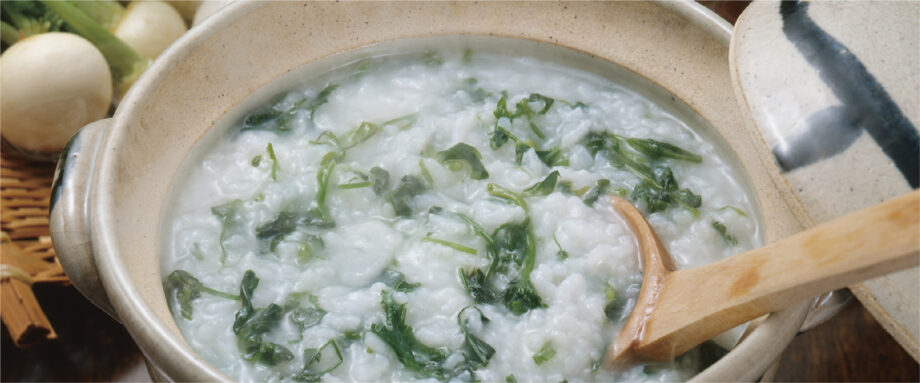Considering “well-being” and own health from inspiration of Nanakusa Gayu (seven herb porridge) The food event providing participants with good insights of own physical condition through cooking and tasting the Japanese traditional meal “Nanakusa Gayu” (seven herbs porridge) in collaboration with chef Keisuke Matsushima. What are the things that traditional foods such as the seven herb porridges, and the unique Japanese calendar and events will bring us? Let’s think about the eating habits fostered in the Japanese traditions through the herb porridge experience.
Traditional events are rooted in the base of our lives in harmony with the four seasons. The best of these is Gosekku (five festivals). The five festivals are seasonal milestones originally set in ancient China. After brought to Japan, the five festivals were associated with ceremonies and rituals in the Imperial Palace, and spread across aristocratic societies as well as the common people as events dedicating offerings to God and praying for sound health.
In China, January 7 is defined as one of the five festivals, “People’s Day Festival”(Jinjitu no Sekku), and there was a custom to eat porridge “Nanashu Sainokan” cooked with seven kinds of young vegetables, wishing for sound health. It is said that people wanted the effect of purging evil spirts and noxious vapor by the herbs that sprout first in the early spring. When this custom was brought to Japan during the Heian period, it was linked to an ancient custom called “Wakana-pickling”, picking up new leaves and vegetables at the beginning of the year and eating their vitality, and established as a “Nanakusa Gayu”.
So why do we still eat the seven herbs porridge? At present, the seven herbs used for the porridge are “water dropwort, shepherd’s purse, cudweed, chickweed, henbit, turnip, daikon radish”. These are so-called medicinal plants in Japan, each of which has medicinal properties such as increasing appetite, increasing digestive function, adjusting intestinal action, preventing hypertension, and beautiful skin, and has been used as a folk remedy since ancient times. In addition, light porridge had the effect of resting the gastrointestinal tract, weakened by heavy drinking and overeating at the end of the year as well as eating fatigue of new year’s meals containing lot of salt.
“It is the well-being, when traditional food is linked to the four seasons and incorporating the wisdom of nature.” says Mr. Matsushima. “Well-being” refers to the state of a person living well physically, mentally and socially.
“Well-being, leading us also to productive aging, is considered a new concept advocated in the field of preventive medicine, but isn’t it a case that our Japanese tradition really is the well-being?”
This time, scope of the event is not just making the herbs porridge with Matsushima. Participants are asked to record their eating habits up to the day of the event in the online eating habits management/improvement app “ASKEN”. This is an attempt to look back at the diet and nutritional status of the year-end and New Year holidays. An objective summary of nutritional status will be introduced on the day of the event, and participants will receive a nutritional advice by a registered dietitian and AI after the event.
Mr. Matsushima says, “Not just eating, rather I would like to understand the meaning and implications through cooking and tasting together, and to reconsider the tradition. And together deepen our thought about the meaning of diet that grows people.” The seven herbs porridge event with Mr. Matsushima will provide you with an opportunity to rest your stomach and intestines and to reconsider what traditional diet can do to people today.




